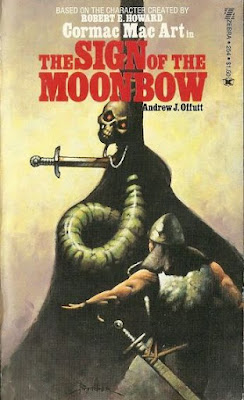Cormac mac Art: The Sign of the Moonbow (1977) by Andrew J. Offut
Andrew J. Offut was a prolific writer in many genres, including science fiction, fantasy, sword and sorcery, and even erotica. In fact, he authored some 420+ published works of erotica under a variety of different pen-names. But his real passion as a writer under his own name was in creating fantasy tales and writing books for the sword and sorcery brands originally created by Robert E. Howard, with 3 Conan books, and a total of 6 books featuring the Gaelic Viking, Cormac mac Art.
Cormac is a contemporary to King Arthur, though the British king never makes an appearance. The Sign of the Moonbow is a direct sequel to The Undying Wizard and picks up immediately after that novel’s resolution with Cormac and his crew having imprisoned the powerful wizard, Thulsa Doom, whom they keep impaled by swords to their ship’s mast to impede his shape-shifting abilities. This imagery is vivid and serves to paint an effective eeriness to the powers of the evil wizard.
The book is divided into 2 separate parts, each linked yet independent. In the first part, Cormac intercedes to rescue a seemingly young girl from Norsemen who are intent on raping her. In returning the diminutive female to her island home they discover she is part of a race of pacifistic fairy folk of ancient Ireland. In the epilog, Offut explains his fascination with legends of fairies and especially leprechauns of Irish lore and sought to incorporate them into his tale.
The second part of the book involves Cormac and his companion, Wulfhere, as they embark on a journey to locate the deposed queen of a different tribe of underground fairy folk whom they are told possesses the power to rid them forever of Thulsa Doom. This involves stepping into other dimensions, or planes of parallel existence, an interesting concept with which almost nothing interesting is done.
I wish I could say all of it pays off with great rewards and action aplenty, but the truth is that this book was at best a couple of decent novellas or short stories, tied together with some of the most affected and distractingly overwritten prose imaginable. It continually tries its best to emulate the speech pattern of its characters with awkwardly inverted sentences and a habit of restating things multiple times in slightly different ways.
The whole book is padded to the extreme with great swaths of unnecessary exposition and history that have no direct bearing on the action at hand. Why, when a battle is about to begin and swords are raised, do we need several paragraphs detailing the design patterns on battle armor and inner monologues about motivation?
Thulsa Doom is easily the best thing about this book, a formidable foe who is unfortunately quickly emasculated and made a servant pawn to our hero—what a waste. My disappointment with this book makes me wonder if Offut’s erotica suffers from the same issues. I won’t be going out of my way to find out.
Reviewed by Steve Carroll




Comments
Post a Comment